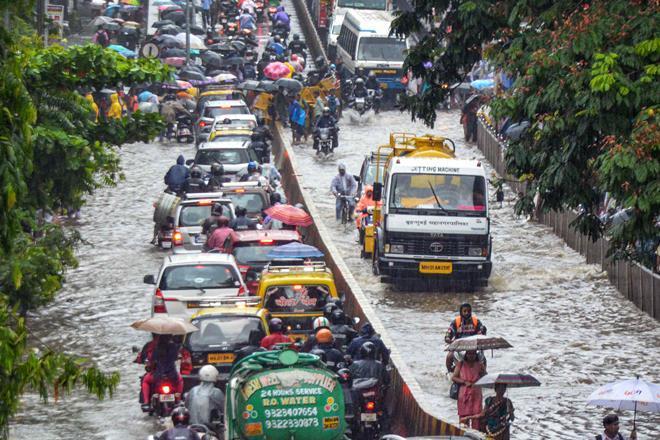Inadequate Drain Infra a Lacuna in Mumbai Flood Management: CAG

Image Courtesy: The Financial Express
Mumbai: While a debate rages on fixing responsibility for water retention in Mumbai during monsoon, a CAG report tabled in the Legislative Assembly Tuesday has listed lack of adequate drain infrastructure and a delay in updating storm water disposal system as some deficiencies in the existing system for management of flood risk.
The Comptroller and Auditor General of India (CAG) report on general and social sector has also observed that drains in Mumbai are adequate only to handle 25 mm rainfall per hour and that there are numerous obstructions in the larger drains due to siphons and other utility services.
It also stated that floodgates have been provided in only three of the 45 outfalls in the drains.
Mumbai witnessed widescale water-logging due to heavy rains that have been lashing the city since Monday.
Mumbai reportedly received the highest rainfall in a decade on Monday with 550 mm average rainfall of the entire month of June exceeding in the previous 48 hours.
As rains pummelled the city, road, train and air services were thrown out of gear in no time on Monday night through early morning on Tuesday.
Chief Minister Devendra Fadnavis has told the Legislative Assembly that Mumbai received around 375 to 400 mm rainfall in three to four hours, which was unprecedented.
The report stated that BRIMSTOWAD master plan has not been updated for the last six years.
The Brihanmumbai Stormwater Disposal System (BRIMSTOWAD) is a project planned to overhaul Mumbai's water drainage system.
Among major "deficiencies" in the existing system for management of the flood risk in Mumbai, the CAG observed that the flat gradients are resulting in drains being affected by tides and pointed out that the system is heavily silted.
"Storm water drains discharge rain water directly by gravity through outfalls as floodgates have been provided in only three of the 45 outfalls. The outfalls discharge below mean sea level," as per CAG.
The report also listed poor workmanship and lack of attention to repairs when the drains are punctured by utility service providers, and poor structural conditions as other deficiencies.
The CAG also listed out measures taken up by the Brihanmumbai Municipal Corporation (BMC) to tackle flooding, which is chronic and recurrent problem in Mumbai during monsoon season from June to September, particularly when spells of intense rainfall coincide with a high tide.
"Disaster Management Unit of the BMC prepares Flood Preparedness Guidelines every year. Ward-wise details of frequent flood prone areas, open places, emergency assembly points, hospitals, food suppliers, fire stations, volunteers and NGOs etc were incorporated in the annual flood preparedness guidelines of MCGM (Municipal Corporation of Greater Mumbai)," it said.
Get the latest reports & analysis with people's perspective on Protests, movements & deep analytical videos, discussions of the current affairs in your Telegram app. Subscribe to NewsClick's Telegram channel & get Real-Time updates on stories, as they get published on our website.
























